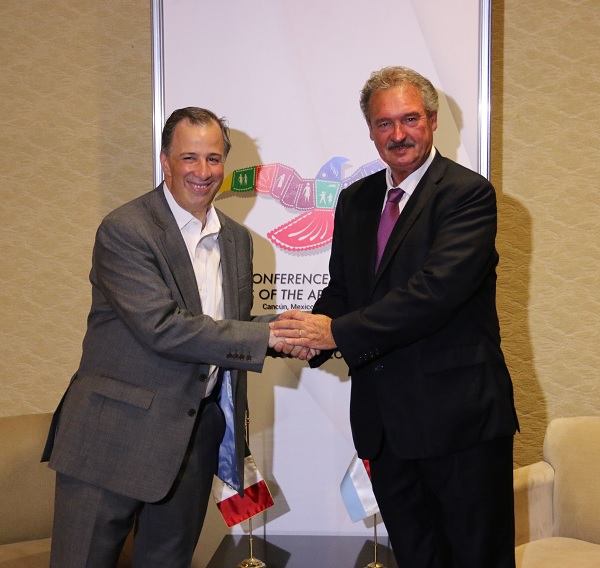
On 24 August 2015, Luxembourg's Minister for Foreign and European Affairs, Jean Asselborn, was in Cancun to participate in the High Level Segment of the First Conference of State Parties of the Arms Trade Treaty (ATT), which will be taking place from 24 to 27 August 2015.
Ninety days after the deposit of the 50th instrument of ratification, acceptance or approval with the United Nations (UN), the ATT came into force on 24 December 2014 following seven years of negotiations. Luxembourg itsely ratified the treaty, legally binding itself to the principals of the treaty, on 13 May 2014 and deposited its instrument of ratification with the UN, solidifying its participation in the treaty, on 3 June 2014.
The Arms Trade Treaty sets high common standards on the control of exports, imports and the transfer of conventional weapons for the 72 states which have ratified, and 59 which have signed, the Treaty. The ATT acts as a significant protective measure for international and humanitarian law as well as human rights, as it postulates, among others, the prohibition of the transfer of conventional arms if the State party authorising the transfer is aware that these weapons would be used for committing acts of genocide, crimes against humanity or any other form of serious violation against human rights.
At the Conference, Minister Asselborn reflected Luxembourg's position in support of this particular clause, stating: "The illicit and unregulated trade of conventional arms fuels conflist and instability by affecting the poorest and most vulnerable communities, creating a terrible human toll."
He cited the treaty as representing "an important advance in our common efforts to work towards a safer world, but is mostly an indispensable element that fills an important gap in international law and reinforced the collective responsibility in international trade weapons", before claiming that he was "particularly pleased that we managed to include the category of small arms and light weapons (SALW) as well as ammunition in the scope of the treaty."
Minister Asselborn then went on to say that "we continue to work with all partners to ensure the full, effective and consistent implementations of the treaty globally. It is important to maintain this positive momentum and work towards the universalisation of the treaty so that the international arms trade is regulated to best effect.
The Minister also reportedly met with his Mexican counterpart, José Antonio Meade Kuribreña, whilst in Cancun, to discuss the state of bilateral relations between the Grand Duchy and Mexico, as well as the situation of human rights in the latter. The Mexican Minister outlined the efforts made by the country to address recent criticism Mexico had received with regards to this sector.
Talks between the two ministers also focused on cooperation between the EU and Mexico, as well as preparations for the COP21 to take place on 11 December 2015 in Paris and the records of international politics.
Minister Asselborn also attended a meeting with Serbian Minister for Foreign Affairs Ivica Dacic in order to discuss several issues of mutual interest for both parties. Such topics included the negotiation process for Serbian accession to the EU, migration pressures in Europe, particularly Balkan routes, as well as dialogue between Belgrade and Pristina. Luxembourg's Ministry of Foreign and European Affairs commented that the meeting affirmed the excellent state of bilateral relations between the Grand Duchy and Serbia.
Photo by Ministry for Foreign and European Affairs (L-R: Mexican Minister for Foreign Affairs, José Antonio Meade Kuribreña; Luxembourg Minister for Foreign and European Affairs, Jean Asselborn)








